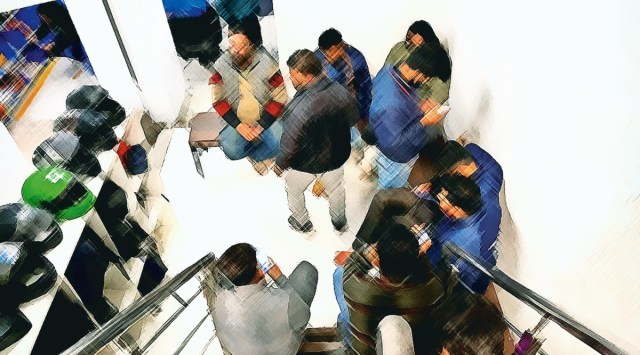At around 4 in the evening, Sonu Pal, a delivery worker with the Zomato-backed quick grocery delivery firm Blinkit (formerly Grofers), completed a delivery after riding his bike on the wrong side of the road, partly on the footpath and without a helmet.

As the final cog in the quick commerce operation wheel, workers like Pal say they would go to lengths for the companies to be able to keep their promise of quick delivery to their customers. In and around Delhi and the neighbouring cities of Gurugram, Noida and Ghaziabad, scenes of such workers driving on the wrong side of the road quickly, sometimes even without a helmet, have become ever so common.
Story continues below this ad
“If we drive while following all traffic rules, it will be very difficult for workers to deliver orders within a short span of 10 minutes. So we do everything we can to deliver orders quickly and oftentimes that means driving too fast or at times on the footpath too,” Pal said.
The price of all this effort? Rs 50 per order on Zomato-backed Blinkit and Rs 537 per week on Zepto, a relatively new entrant in the space, which is already valued at around $570 million and is eyeing the coveted status of a unicorn — a billion dollar private company.
Pal earns around Rs 20,000 each month. But after accounting for Rs 100 worth of petrol everyday and monthly bike maintenance charges of around Rs 700, he said he effectively brings in around Rs 16,000.
When asked about its delivery workers breaking traffic rules, a Blinkit spokesperson said that its dark stores are located within 2 kms of a customer. “With this density of stores, our partners don’t need to break any traffic rules to deliver orders under 10 minutes”. Zepto CEO and co-founder Aadit Palicha told The Sunday Express that in delivering a million orders, a very small fraction — “in decimals” — of its delivery workers have been mildly injured. Neither company said if it sensitises its delivery workers on road safety issues. For several workers engaged with such quick delivery firms, life as a delivery person on a motorbike is all too familiar. Many of them used to be delivery personnel at Swiggy or Zomato, and some even drove cabs for Ola and Uber.
Story continues below this ad
During their time in these companies, they resolutely fought many battles — against uncertain income, a low base pay, and an algorithm they say pushed them to ride for hundreds of kilometres a day in return for disproportionately low cash. For some, that meant looking for another job.
The Sunday Express spoke to fifteen workers at quick delivery platforms Zepto and Blinkit in the National Capital Region to understand how and why they chose this job. All of them had worked at Swiggy, Zomato, Uber and Ola. Their stories, too, had a common theme: disillusionment.
In Gurugram, Blinkit delivery worker Sushil Yadav quit his job at Swiggy four months ago after being disappointed with the pay. In Delhi, Brijesh Singh, who now works at Zepto, had to sell his cab that he used to drive for Uber after the third wave of the coronavirus pandemic, owing to financial difficulties. In Ghaziabad, Pal too gave up his job at Zomato as driving long hours on the bike gave him chronic back issues and joined Blinkit. The delivery schedule here may be taxing, but the commute is shorter.
But workers feel that inherent problems with the very model on which platform companies like Blinkit and Zepto are based, poses newer challenges to the job.
Story continues below this ad
Residential societies in Noida, Gurugram and Ghaziabad throw a unique challenge — from reaching the main gate of these societies, to talking to the guards and finally navigating their way to the exact house in the complex itself takes around 4-5 minutes, putting the 10 minute delivery timeline in jeopardy. To avoid that, workers have resorted to marking an order as delivered on their app right when they reach the main gate of such apartment complexes.
But Blinkit penalises such actions under a specific penalty called MDND — ‘Marked Delivered, Not Delivered’. If a user complains of MDND in the time that a worker enters the apartment complex and reaches their home, they are penalised Rs 300 each time on Blinkit. Zepto claims to have no such penalty.
“It has been left to us to fulfil the company’s tall promises, so we do everything in our capacity to achieve that. But when the company goes ahead and penalises us, in what world is that fair,” Pal said.
There are other penalties too, some of which do not even depend on delivery personnel’s error, workers said. One of those is a penalty in case these workers deliver an order with a product or two missing. On Blinkit, the penalty for this is Rs 50, which the delivery worker has to bear.
Story continues below this ad
But Pal explained that this error usually happens at the end of the people who are supposed to pack orders. “These packers have around 1 minute on an average to pack the orders and they sometimes miss an item. Why should I be penalised for this error?” he asked.
Yadav meanwhile highlighted clear “discrimination” that comes associated with his job. “Many apartment complexes don’t allow us to access lifts that residents use as if we will pollute those spaces,” Pal said.
There is some amount of unpaid labour that deliveries workers have to put in the race to deliver orders quickly, that q-companies are oblivious to, workers said.
Shahbaz Khan, who works for Blinkit, recounted one such incident: “I was at an apartment complex in Noida and both lifts in the building were occupied because another set of workers were shifting a family’s furniture through them. I had to deliver an order on the sixteenth floor but the lift was not getting vacant. So I helped the other workers in loading things to the lift so that the work gets done quickly. I will not get paid for that labour, but it doesn’t mean I didn’t work.”

































